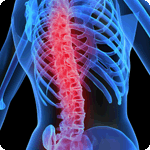Herniated disc
Causes of Herniated disc
As mentioned above, the older you get, the more at risk you are of a herniated disc. However, herniated disc injuries can also happen during injury or strain to your back. Middle aged and older men are at higher risk for herniated disc. Other conditions may also be a contributing factor, such as being born with a thinner or thicker spinal canal, or spinal stenosis, a condition that causes the space around your spinal cord to shrink.
Herniated disc Symptoms
As mentioned above, the older you get, the more at risk you are of a herniated disc. However, herniated disc injuries can also happen during injury or strain to your back. Middle aged and older men are at higher risk for herniated disc. Other conditions may also be a contributing factor, such as being born with a thinner or thicker spinal canal, or spinal stenosis, a condition that causes the space around your spinal cord to shrink.
Check with your physician in order to properly diagnose a herniated disc. Your doctor will perform a physical examination to determine the location of the injury and whether or not it is a slipped disc. He or she may also ask that diagnostic tests, such as X-rays or an MRI are used to rule out other causes of your back pain.
Treatment for Herniated disc
As with any injury, your doctor will be the best source of advice on the appropriate treatment method for your situation. Treatment for herniated disc varies depending on the symptoms, the age of the patient, and their activity level. Herniated disc treatment often begins with resting the area. Anti-inflammatory medications such as ibuprofen and aspirin may be used to help with the pain. Cold therapy and heat therapy may be used to help relax the muscles and to provide additional pain relief.
Note: For cold therapy of the lower back, check out the Aircast Back Cryo/Cuff w/ Cooler.
Typically physical therapy is the next step in the rehabilitation process. Your therapist will teach you the proper way to lift objects and help you perform strengthening exercises that improve the muscles that support your spine. You may also learn stretching exercises to increase the flexibility in your back and legs.
In cases where the herniated disc does not improve, or where there is extreme pain, your doctor may suggest steroid injections. This reduces the inflammation in the pinched nerves, providing relief for the patient. If the options listed above provide no relief to your pain, or in severe cases of herniated disc, your doctor may suggest surgery to remove the herniated disc.
SUPPORT & PROTECTION FOR HERNIATED DISCS
View all Braces and Supports for Herniated Discs
-
 On Sale 0% Off Save $0.00(6) ReviewsProtect your back with the DonJoy® Back Brace — designed for superior lumbar support and pain relief. Ideal for injury recovery and chronic back discomfort, it offers adjustable compression and breathable comfort. Stay strong and supported with trusted orthopedic back care built to keep you moving.
On Sale 0% Off Save $0.00(6) ReviewsProtect your back with the DonJoy® Back Brace — designed for superior lumbar support and pain relief. Ideal for injury recovery and chronic back discomfort, it offers adjustable compression and breathable comfort. Stay strong and supported with trusted orthopedic back care built to keep you moving.The Back Brace can be used to treat or prevent the following back injuries:
- Disc Herniation or Degeneration
- Acute and Chronis Back Pain
- Activity or Work-Related Low Back Pain
-
 $36.31On Sale 0% Off Save $0.00(47) ReviewsThe DonJoy ComfortFORM Back Support is designed to provide comfortable, low-profile support for the lower back. Constructed with durable power mesh elastic and a molded lumbar compression pad, it offers support for the sacrolumbar region of the spine. Overlapping double pull straps provide additional support to the lumbar and abdominal area to promote proper spinal alignment and help prevent and protect injuries, including strains and sprains. Silicone gripper strips on either side of the back pad help prevent migration. Latex-free and suitable for wear under or over clothing.
$36.31On Sale 0% Off Save $0.00(47) ReviewsThe DonJoy ComfortFORM Back Support is designed to provide comfortable, low-profile support for the lower back. Constructed with durable power mesh elastic and a molded lumbar compression pad, it offers support for the sacrolumbar region of the spine. Overlapping double pull straps provide additional support to the lumbar and abdominal area to promote proper spinal alignment and help prevent and protect injuries, including strains and sprains. Silicone gripper strips on either side of the back pad help prevent migration. Latex-free and suitable for wear under or over clothing.





 Our spines contain many discs that sit between the vertebrate (bones) of our spine. Younger individuals tend to have discs that are flexible and elastic. As we age, these discs become increasingly rigid. A less elastic disc is more likely to be injured than a flexible one. A herniated disc, also known as a slipped disc, occurs when one of these spinal discs ruptures and moves out of place. This can pinch the nerves in your spine or even your spinal column.
Our spines contain many discs that sit between the vertebrate (bones) of our spine. Younger individuals tend to have discs that are flexible and elastic. As we age, these discs become increasingly rigid. A less elastic disc is more likely to be injured than a flexible one. A herniated disc, also known as a slipped disc, occurs when one of these spinal discs ruptures and moves out of place. This can pinch the nerves in your spine or even your spinal column.






